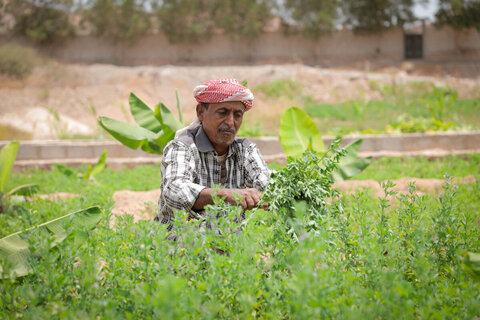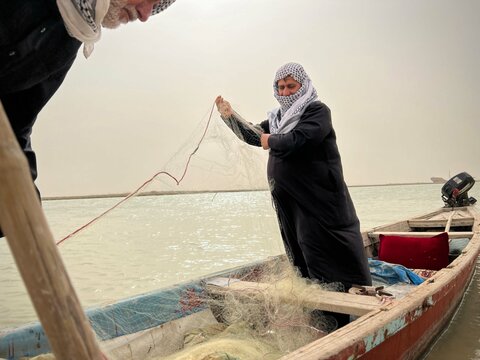Coronavirus tests the resilience of Iraq’s displaced people to the limit

Interviews and additional reporting by Alan Salman
Like many Yazidi families displaced and scattered in camps after having fled Isis, Khalid's family left their home in Sinjar when violence escalated in 2014.
The family first escaped into the Sinjar mountains, where they stayed for nine days with barely any food — he, his wife Naam, and their four daughters only narrowly survived. Deciding it was better to leave, they began walking 40 km towards the Syrian border, reaching a camp in Syria.
‘I want to be a physician when I grow up, so I can take care of my sister.'
They rested two days, exhausted, then departed again for the Kurdistan Region, finally arriving in Duhok. There, they stayed in an unfinished building, for one year. "It was very tough," Khalid says. "Our youngest girl was still an infant."

Since late 2015, the family's lived in the Zakho camp of Iraq's Kurdistan Region. Khalid was able to find work in the farmlands nearby — work was available for Naam, too. The couple sometimes even took their daughter with them to the fields, selling produce they harvested at roadside markets.
They had hoped to secure a piece of land that they could cultivate for themselves but that didn't happen and Khalid got a job as a guard for a child-friendly space.
‘We are eating more simple foods to make sure our budget lasts longer — everything is very uncertain.'
Then coronavirus arrived and he was laid off. In the past two months, he's found demand for casual labour has dried up too — Khalid is keen to take odd jobs to help pay for the medical expenses of his second-youngest daughter, Khalida, who has cerebral palsy.
Coronavirus is placing impossible strain on the family's already stretched resources.
"Before, I was able to find some work, which helped support my family," says Khalid. "But I lost the modest income I used to earn. Even when we can move freely again, we do not have enough money saved to take our girl … to the doctors we used to visit in Erbil and Duhok."

WFP provides monthly cash assistance to Khalid's family through mobile-phone money transfers. These enable them to redeem entitlements via their phones, inside the camp. In response to the COVID-19 crisis, WFP has collaborated with partners to scale up food assistance to reach a further 35,000 refugees and 10,000 internally displaced people across Iraq.
"We are counting every dinar and have no idea what will happen in the next two to three months," says Khalid. Price hikes since March have made life next to impossible for the family, placing foods and household items out of their reach.
"If this situation continues, we will be severely impacted," says Khalid. "I am the main breadwinner for my family. My wife works whenever she can, too. Our four girls would usually be in primary school — but, of course, schools have been closed since the end of February."

His daughters on their part are doing their best to stay positive. "I hope that we return to school soon," says 10-year-old Lana. "I want to be a physician when I grow up, so I can take care of my sister."
WFP's monthly cash assistance means that Khalid can buy different kinds of food for his family from the camp's local market. Given the COVID-19 situation, he prefers to buy basic food items that have a longer shelf life, so he can go out less.
"The children love cereals, chicken and chickpeas," says Khalid's wife. "But right now, we are eating more simple foods to make sure our budget lasts longer — everything is very uncertain."
Following awareness training provided by WFP and partners on avoiding COVID-19 and staying healthy, Khalid and his wife make sure that the family take extra care. "I am the only one who goes to market to bring all our family's needs once weekly. And I maintain a safe distance between myself and other people when outdoors," he says.
With thanks to the German Federal Foreign Office (GFFO), USAID BHA, ECHO, Japan, Canada, Belgium, Italy, the Republic of Korea, Switzerland, the Republic of Ireland and Luxembourg for their continued support to the people reached by the World Food Programme in Iraq, especially during the current pandemic.


